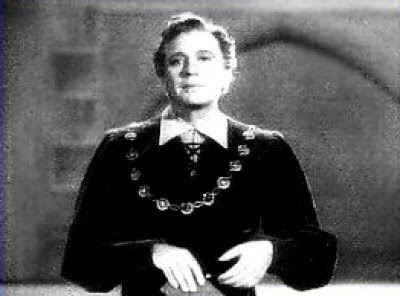
Hamlet played by Joseph Tura
The title of Ernst Lubitsch’s 1942 film offers a double meaning. Of course there’s the Hamlet reference which I’ll get to in a moment, but remembering that the film concerns the Polish occupation by Nazi Germany it’s a question and a call to arms – do we hide away in these difficult times surrender ourselves to death (not to be) or be true to ourselves and battle against what presently seems inevitable (to be)?
Within the film, that means that the group of actors continue their profession but instead of performing for an audience, they bend their skills to self preservation and fighting the oppressor, wearing disguises and improvising and generally being very convincing for all that. Of course, depending on how you’re interpreting Hamlet itself, the prince is either mad or using his acting skills himself to feign madness to avenge his father’s death.
The play’s appearance in the film is largely played for laughs. On both occasions that we glimpse the production it’s viewed from the stalls as the Polish actor Joseph Tura (Jack Benny) steps forward to deliver ‘To Be Or Not To’ on each occasion the opening line sparking the walk out of a service man which he initially suspects has something to do with his acting skills but he later discovers is the code his wife is using to let gentlemen callers that they can visit her dressing room because he’ll be on stage for a while.
The staging is fairly stereotypical, a stone castle hallway and medieval dress and we don’t have much of an idea of what the rest of the show will be like, because we don’t need to. It’s interesting to see that Tura’s Hamlet’s reading a book, not unlike Jacobi in the BBC production though he doesn’t read from it, shouting the lines instead at the prospective cuckold as he dashes for the exit. He’s not one of the greats; as one Nazi officer notes: “"Oh, yes I saw him [Tura] in 'Hamlet' once. What he did to Shakespeare we are now doing to Poland".”
The film has a cross genre appeal years ahead of its time, merging what initially looks like a fairly traditional back stage farce with elements of the spy and war movies. It is often hilarious, which drew some controversy at the time of release and the film flopped presumably because it was ‘too soon’ and the public weren’t ready for jokes about the occupation which sparked the war. What they missed is that like the play which inspired its title, the comedy and tragedy are intermixed and interchangable and the film is at its darkest when the Nazis frogmarch into Warsaw.